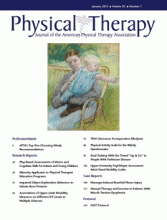Abstract
Background Play is vital for development. Infants and children learn through play. Traditional standardized developmental tests measure whether a child performs individual skills within controlled environments. Play-based assessments can measure skill performance during natural, child-driven play.
Purpose The purpose of this study was to systematically review reliability, validity, and responsiveness of all play-based assessments that quantify motor and cognitive skills in children from birth to 36 months of age.
Data Sources Studies were identified from a literature search using PubMed, ERIC, CINAHL, and PsycINFO databases and the reference lists of included papers.
Study Selection Included studies investigated reliability, validity, or responsiveness of play-based assessments that measured motor and cognitive skills for children to 36 months of age.
Data Extraction Two reviewers independently screened 40 studies for eligibility and inclusion. The reviewers independently extracted reliability, validity, and responsiveness data. They examined measurement properties and methodological quality of the included studies.
Data Synthesis Four current play-based assessment tools were identified in 8 included studies. Each play-based assessment tool measured motor and cognitive skills in a different way during play. Interrater reliability correlations ranged from .86 to .98 for motor development and from .23 to .90 for cognitive development. Test-retest reliability correlations ranged from .88 to .95 for motor development and from .45 to .91 for cognitive development. Structural validity correlations ranged from .62 to .90 for motor development and from .42 to .93 for cognitive development. One study assessed responsiveness to change in motor development.
Limitations Most studies had small and poorly described samples. Lack of transparency in data management and statistical analysis was common.
Conclusions Play-based assessments have potential to be reliable and valid tools to assess cognitive and motor skills, but higher-quality research is needed. Psychometric properties should be considered for each play-based assessment before it is used in clinical and research practice.
Footnotes
Both authors provided concept/idea/research design, writing, data collection and analysis, and project management. Mr O'Grady provided consultation (including review of the manuscript before submission).
The authors acknowledge the contributions of Virginia Commonwealth University Health Sciences librarian Jennifer McDaniel for her assistance with defining search terms.
- Received March 6, 2014.
- Accepted August 14, 2014.












